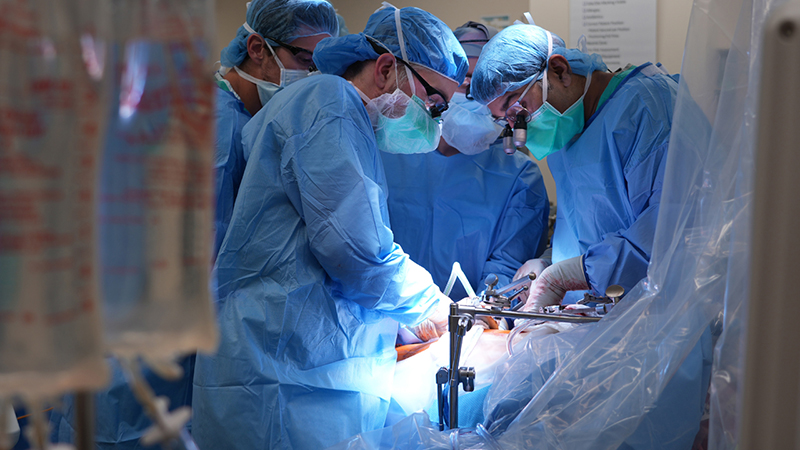Hispanic Breast Cancer Clinic Provides Specialized Care for Patients
At Robert H. Lurie Comprehensive Cancer Center at Northwestern Memorial Hospital
Published October 2023
In the United States, breast cancer incidence in Hispanic and Latin American women* is 28% lower than in non-Hispanic white women, who have the highest incidence rate. Despite these lower occurrence rates, Hispanic women are more likely to be diagnosed with late-stage breast cancer. At this stage, cancer is harder to treat, which means Hispanic and Latin American women have a 30% higher mortality rate from breast cancer. These numbers highlight the significant health inequities this population faces when it comes to accessing high-quality breast cancer care and screening.
“What we see in the Hispanic community is that the women are being diagnosed at later stages, even though their diagnosis tends to be at a younger age,” says Claudia Tellez, MD, a medical oncologist at Robert H. Lurie Comprehensive Cancer Center of Northwestern University at Northwestern Memorial Hospital. “And because they’re being diagnosed at a later stage and often with more aggressive types of breast cancer, their prognosis is less favorable.”
We want every patient to be confident in their treatment plan.— Claudia Tellez, MD
Dr. Tellez is working to change this by breaking down barriers and offering Hispanic patients better access to breast cancer screening, treatment and research with the recently launched Lurie Cancer Center Hispanic Breast Cancer Clinic at Northwestern Memorial Hospital.
“Many Hispanic women in Chicago struggle to access care or are not receiving the highest standard of care because of language barriers, financial limitations and other factors,” says Dr. Tellez, who is the medical director of the clinic. “Our team is dedicated to addressing these disparities and improving access by providing culturally sensitive care, bilingual support and educational resources tailored to the needs of Hispanic patients.”
Excellent Communication Guides Excellent Cancer Care
Led by Dr. Tellez, who is a native of Colombia, the Hispanic Breast Cancer Clinic offers personalized care from a multidisciplinary team of breast cancer experts, supportive care specialists and administrative staff who all speak Spanish. All patients have a core clinic team that includes a physician, nurse, medical assistant, social worker and research assistant.
“Getting a breast cancer diagnosis is scary and overwhelming — even more so when you can’t access care in your preferred language,” says Dr. Tellez. “Patients who come to us can expect a safe and welcoming environment where each person they encounter, starting from their first phone call through their treatment, will speak Spanish. We want every patient to be confident in their treatment plan and feel comfortable communicating with a care team that embraces their culture and speaks their preferred language.”
Connecting Patients With Research and Care for Cancer
One of Dr. Tellez’s goals for the new clinic is to increase the number of Hispanic patients participating in clinical trials for breast cancer, an area where they are consistently underrepresented.
Hispanic people who have breast cancer account for about one-third of all people in Chicago with breast cancer. If clinical trial participation in Chicago was proportional to those demographics, a third of participants would be Hispanic. However, that’s not the case.
“We see less than 10% Hispanic patients participating in clinical trials in the city of Chicago,” explains Dr. Tellez. “And for pharmaceutical company trials, it’s even lower at around 2.5%.”
In addition to often being diagnosed younger and with later stage cancers, Hispanic and Latin American women are at higher risk for triple negative breast cancer and HER2-positive breast cancer, aggressive subtypes of the disease that require a targeted treatment plan.
“There are distinctive features about Hispanic women with breast cancer. For instance, they have subtypes of breast cancer that are unique, and we need to be aware of that and treat them accordingly,” says Dr. Tellez. “Participation in clinical trials often means access to new drugs or treatments that aren’t available otherwise. More participation and representation also create an opportunity for clinical trials that are very specific to those subtypes, such as triple negative, and can help improve treatments for the disease.”
Community outreach and collaboration with Hispanic health advocates will be an important element to the success of the Hispanic Breast Cancer Clinic.
“We’re working with community groups and health advocates who are known and trusted in the community. Together, we want to ensure that Hispanic women are knowledgeable about the importance of regular screenings and early detection,” says Dr. Tellez. “And if they need care, we’re here and ready to help. Our goal is to ensure that every patient who walks through our door has the information, education and resources needed for the best possible outcome in their breast cancer journey.”
To schedule an appointment with the Hispanic Breast Cancer Clinic, call our Spanish-speaking patient liaison at 312.472.0805 (TTY: 711). Or, you can visit Lurie Cancer Center Hispanic Breast Clinic at Northwestern Memorial Hospital.
*Scientists do not always collect information from participants about gender identity. To avoid misrepresenting the results of this research, we use the same terminology as the study authors.






